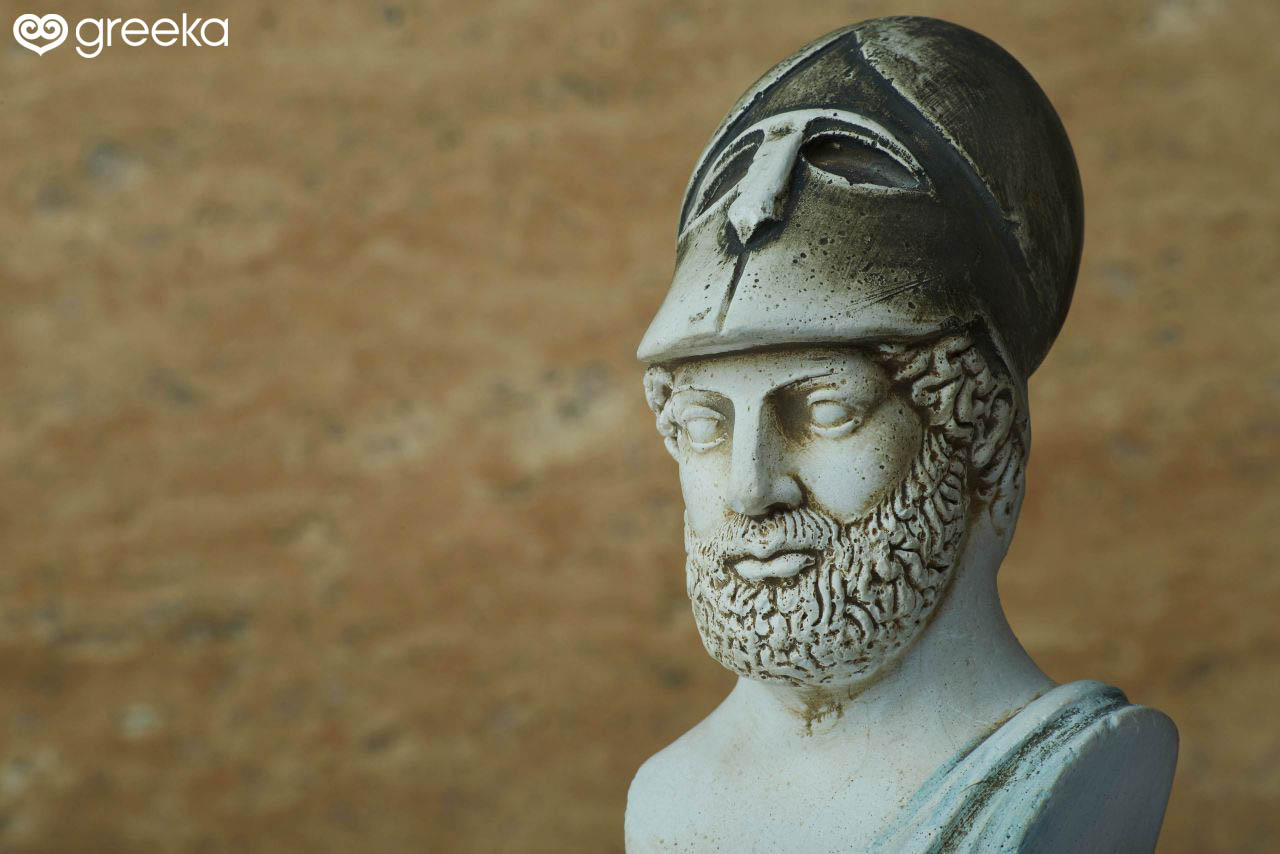Pericles

Pericles was the most famous and influential Athenian statesman of ancient Greece. His name means surrounded by glory in ancient Greek. Pericles was born in the small town of Holargos, north of Athens, in 495 BC. His father was Xanthippus, famous for his commandership, which led to the Greek victory over the Persians, at Mycale, in 479 BC.
His mother was Agariste, who came from the wealthy family of Alcmaeonidae. It is narrated that, while she was pregnant, Agariste dreamt that she would give birth to a lion, a sign that the child would be strong and brave.
Pericles was shy in his early years. He devoted most of his time to education and was greatly inspired by his two mentors, the sophist philosopher Damon and the Ionian philosopher Anaxagoras. Some of his notable friends included historian Herodotus, sculptor Phedias and sophist Protagoras. He always appears in statues with beard and a helmet. It is said that Pericles would always wear his helmet in public to hide his unusually oblong head.
Political career
His political career took off in the spring of 472 BC when in the religious festival of Dionysus, he presented the play of Aeschelus, Persae, to the audience, a sign that he was one of the wealthiest men in Athens that time. Gradually, Pericles managed to weaken his political opponents, Cimon and Ephialtes, and in 461 BC, he became the ultimate statesman in Athens. He remained in power for almost forty years, till his death in 429 BC, and scientists name this years the golden age of Pericles, as under his guide, Athens became the most powerful city-state in Greece.
Interest in education
Pericles showed special interest to the education of the lower social classes. He thought that all Athenians should be educated in philosophy, art, music and poetry. He also built many gymnasiums for the young people to exercise their body. As part of education, Pericles believed that theatre was an important part, which is why he passed a law that the state was burdened with the theatre tickets of the lower classes, so that all Athenians could attend theatrical plays.
Pericles also constructed many public works, monuments and temples in Athens. The great walls that protected Athens and Piraeus were his work. The Acropolis was built after his encouragement and with the money of the Delian League, as Athens became the leader of this league in his time. War and commercial ships were built that developed trade all over the Mediterranean and made Athens the greatest naval power in Greece.
Aspasia and her trial
Due to his popularity, Pericles was much hated by his political opponents, who in 432 BC accused him, his companion Aspasia and their friends of immorality. Particularly, they accused Aspasia of corrupting the women of Athens. Pericles, in 465 BC, had divorced his legal wife, who bore him two sons, to live with Aspasia, a courtesan from Miletus.
Courtesans, or else heterae, were very popular in ancient Athens and in fact, they were educated women who frequently hosted philosophers and politicians in their houses. These women were highly respected for their mind and, as they were usually foreigners, they were the only women allowed to walk unescorted in the streets.
The opponents of Pericles also accused Aspasia of involving Athens in two wars. The first was in 440 BC, when Pericles persuaded the Athenians to interfere between the conflict of Samos and Miletus, the homeland of Aspasia, and the second war was the Peloponnesian War that had just started. Pericles, in a great emotional scene, presented in the court with tears in his eyes and persuaded the judges to release Aspasia from the accusations.
The death
Pericles, the inspired statesman of Athens, the wonderful orator and the brave general, died in 429 BC, during the First Peloponnesian War, of plague. That time, the Spartans were besieging Athens, whose residents had been gathered inside the walls. However, a great plague burst that killed almost half the population of the city, including Pericles and his two sons from the first wife.
Before he died, Pericles managed to grant the Athenian citizenship to his son with Aspasia, breaking a law he himself had established in 451 BC, according to which the Athenian citizenship is granted only to people whose both parents are Athenians.
His death was a great strike for the city, as all his successors were proven inferior to him. Without his inspired guidance, Athens eventually lost the Peloponnesian War and, after that, it never managed to recover its glory. It can be said that Pericles was the man who gave Athens its power and the man who deprived it with his death.
Want to discover more famous people?
Next personality: Leonidas, the king of Sparta